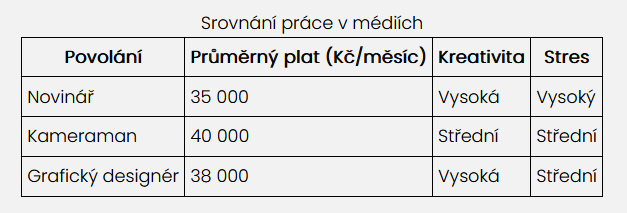As a media professional, you'll be in the thick of the action, getting first-hand information and communicating it to the world. You will work with information, process it and present it in an attractive way. Whether it's writing articles, shooting reports or creating online content, you'll always need to think creatively and strategically. The media sector offers a wide range of professions, from journalists and editors, to cameramen and editors, to PR specialists and online marketers. It's important to have a constant appetite to learn and develop, to follow trends and adapt to the ever-changing media landscape.
Different types of media
The media sector is a broad term that encompasses many different professions and job roles. Working in the media is not just about fame and attention, as it may seem. It requires hard work, resilience to stress and the ability to work under pressure. The most well-known types of media include print (newspapers, magazines), radio, television, and last but not least, online media. Each of these types of media has its own specifics and requires specific knowledge and skills from workers. For example, a journalist in the print media must be able to write engaging and informative articles, while a radio presenter must captivate listeners with his or her voice and speech. With the development of technology and the advent of the internet, online media are becoming increasingly important. Working in the online media is dynamic and creative, but at the same time demanding in terms of time and flexibility. Online journalists must be able to work with multimedia, navigate social networks and respond quickly to current events.
Required Skills
A wide range of skills is essential for a successful career in media. Strong communication skills, whether written or oral, are essential. You must be able to communicate information clearly and engagingly, whether you are writing an article, shooting a video report or conducting an interview. Creativity and the ability to think innovatively are key in this dynamic environment. The media is constantly evolving and you need to be able to come up with new ideas and concepts to engage your audience. Also important is adaptability and the ability to work under pressure. Working in media is often fast-paced and deadlines are relentless. You need to be able to manage stress and work effectively in challenging situations. Knowledge of foreign languages, particularly English, is a big advantage, as is familiarity with working with media and technology.
Education and courses
The media sector is dynamic and constantly evolving, so ongoing training and skills development is key to a successful career in this field. There are many opportunities to further your education and gain the necessary knowledge and competencies. Colleges offer bachelor's and master's degree programmes focusing on journalism, media studies, marketing communications and other relevant fields. These programmes provide students with a comprehensive knowledge of media operations, ethics, writing, audiovisual production and other important aspects. In addition to formal education, there is a wide range of courses, workshops and training that focus on specific skills and trends in the media industry. These include courses in writing for the web, digital marketing, podcast production, graphic design, social media and much more. These courses are suitable for those who want to expand their knowledge in a particular area, improve their use of specific tools, or learn about the latest trends. When choosing courses, it is important to pay attention to their relevance, the quality of the instructors and references from previous participants.
Media job search
Finding a job in the media, whether it's TV production, radio broadcasting, online journalism or print media, can be challenging but exciting. The media industry is highly competitive, so it's important to be well prepared and have a strategy.
Information about jobs in the media sector can be found from a variety of sources. Many job portals specialize in media and offer a wide range of positions, from production assistants to experienced editors. Also regularly monitor the websites and social media of media houses, where they often post vacancies.
Networking is key in the media industry. Attend industry events, workshops and conferences to meet people in the industry and learn about potential job opportunities. Don't underestimate the power of your professional social media profile and keep it up to date.
Working in media is like sailing on rough seas. You have to have a strong stomach, a sturdy boat, and know how to navigate the storm to get to safe harbor.
Radomír Dvořák
Journalist, editor, editor
The world of media is dynamic and exciting and at its heart are journalists, editors and editors. These professionals play a key role in informing the public, shaping opinions and providing a platform for debate. Journalists are responsible for finding, researching and reporting the news. They conduct interviews, analyze data and write articles that appear in newspapers, magazines and online. Editors oversee the work of journalists, edit articles and ensure their accuracy, objectivity and stylistic standards. Editors are in charge of the overall concept and direction of the publication. They select topics, determine the point of view and ensure that the content is relevant to the target audience. Working in the media is challenging but rewarding. It requires a passion for the truth, excellent communication skills and the ability to work under pressure.

Cameraman, sound engineer, editor
Creating audiovisual content, whether it's a film, TV show or online video, requires a close-knit team of talented professionals. The most important ones are undoubtedly the cameraman, sound engineer and editor. The Cameraman is responsible for the visual aspect of the work. His or her job is to capture the action and emotion through composition, lighting and camera movement. The sound engineer takes care of the sound component, recording dialogue, movement and atmosphere to ensure that the sound adds to the atmosphere and is intelligible. The Editor gives everything its final shape. He selects the best shots from the recorded material and composes them into an engaging and dynamic whole. Working in the media in these professions is demanding, but at the same time very creative and varied. It requires technical knowledge, an eye for detail and the ability to work in a team.
Marketing and PR in the media
Media work in marketing and PR is dynamic and constantly evolving. It requires creativity, strategic thinking and the ability to work under pressure. Marketing and PR professionals in media are responsible for building and maintaining a positive image of a media entity, whether it is a TV station, radio station, newspaper or online magazine.
In addition, they take care of promoting programmes, shows and content, reaching out to target groups and building relationships with journalists and influencers. Working in media marketing and PR covers a wide range of activities, from creating press releases and organising press conferences to managing social media and online campaigns.
To work in this field it is essential to have excellent communication and presentation skills, knowledge of the media environment and an interest in current affairs. Knowledge of foreign languages, especially English, is a great advantage.
Social Media and Online Content
Social media and online content have become an integral part of working in the media. Media today use platforms such as Facebook, Instagram, Twitter and YouTube to spread the news, reach audiences and build relationships with readers and viewers. To work in the media sector, it is therefore essential to understand how social media works, know the principles of creating engaging content and be able to work with analytical tools. Journalists and editors today must be able to work with the online environment and effectively use its potential to disseminate information. At the same time, it is also important to be aware of the specifics of working with online content, such as the speed of dissemination of information, the need to verify sources and to work with comments and feedback from users. Working in the media is thus becoming more dynamic and complex, requiring journalists and other media professionals to constantly monitor current trends and develop digital skills.
 Source: citarny.cz
Source: citarny.czSalaries and Benefits
Salaries in the media sector vary widely depending on position, experience, region and type of media outlet. In general, beginning journalists, editors and graphic designers cannot promise high salaries. However, with increasing experience, specialisation and responsibility, pay can increase. The highest paying positions in the media usually include senior management positions, experienced television presenters, commentators and investigative journalists. In addition to a base salary, the benefits package may include overtime pay, meal allowances, retirement benefits, a laptop, a phone, and more. Working in the media is often time-consuming and requires flexibility. Journalists and editors often work weekends and holidays to cover current events.
Trends and the future of media
The media world is constantly evolving and so are the job opportunities it offers. The Digital Revolution has brought new platforms and formats into play, from podcasts to online magazines and social media. Working in the media is no longer just about writing newspaper articles or making TV reports. Those interested in a career in the media can work as influencers, YouTubers, podcasters, social media specialists, data analysts and in many other professions. The ability to be creative, work with information and adapt to new trends is important. The future of media will belong to those who are not afraid of innovation and can reach audiences across platforms. But at the same time, it is important to remember that working in the media is demanding and requires a high workload, resilience to stress and a willingness to learn new things. Foreign language skills, especially English, are also essential.

Challenges and Opportunities
Working in the media has always attracted creative and communicative individuals. But today the sector is undergoing rapid change and with it comes new challenges. Digitalisation and the rise of social media have completely transformed the way we consume information. Journalists and media houses must adapt to constantly evolving technologies and trends to keep up with the times and engage audiences. Combating misinformation and fake news is another pressing issue that plagues the media world. In the flood of information, it is increasingly difficult to distinguish truth from falsehood, and journalists have a key role to play in combating the spread of fake news. Despite these challenges, working in the media continues to offer many opportunities. There is a growing demand for quality and objective reporting and for people who can handle information and engage audiences.
Source: citarny.cz

